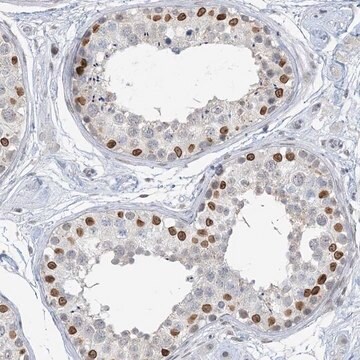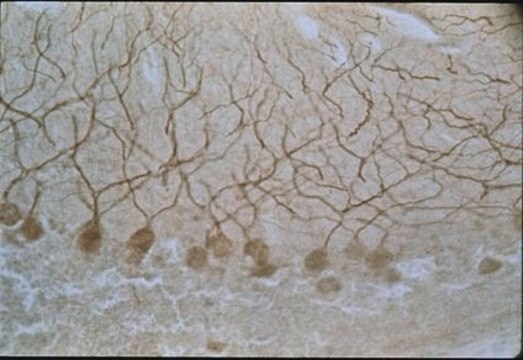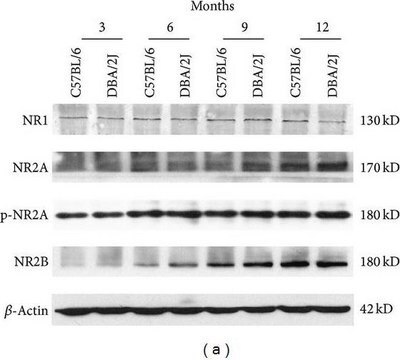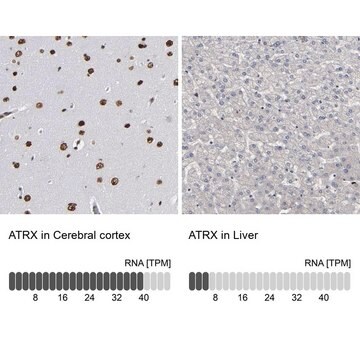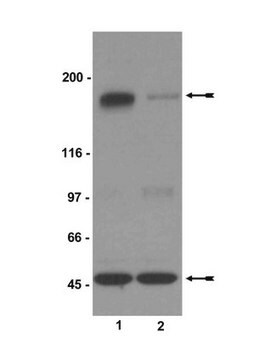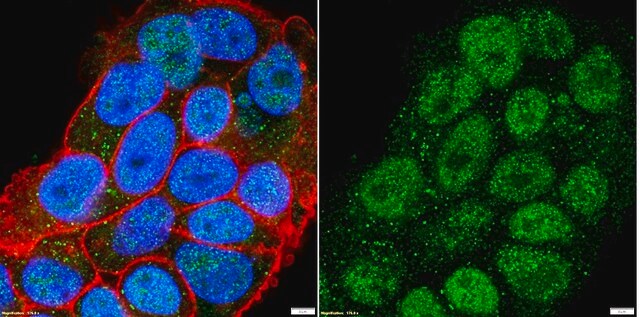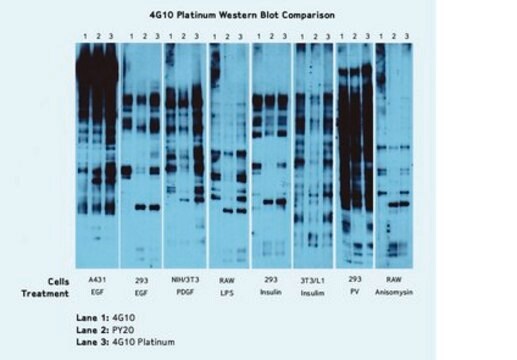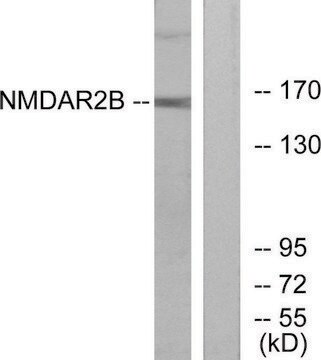MAB5778
Anti-NMDAR2B Antibody, CT
ascites fluid, clone 1C6.5C4, Chemicon®
Zaloguj sięWyświetlanie cen organizacyjnych i kontraktowych
About This Item
Kod UNSPSC:
12352203
eCl@ss:
32160702
NACRES:
NA.41
Polecane produkty
pochodzenie biologiczne
mouse
Poziom jakości
forma przeciwciała
ascites fluid
klon
1C6.5C4, monoclonal
reaktywność gatunkowa
human, rat, rabbit, mouse
producent / nazwa handlowa
Chemicon®
metody
western blot: suitable
izotyp
IgG1
numer dostępu NCBI
numer dostępu UniProt
Warunki transportu
dry ice
docelowa modyfikacja potranslacyjna
unmodified
Specyficzność
NMDAR2B, C-terminal. By Western blot the antibody reacts with a band at ~170 kDa on rat brain lysate.
Immunogen
Recombinant protein from rat NMDAR2B.
Zastosowanie
Research Category
Neuroscience
Neuroscience
Research Sub Category
Neurotransmitters & Receptors
Neurotransmitters & Receptors
This Anti-NMDAR2B Antibody, C-terminal is validated for use in WB for the detection of NMDAR2B.
Western blot: 1:100-1:1,000 on rat brain lysate.
Optimal working dilutions must be determined by end user.
Optimal working dilutions must be determined by end user.
Postać fizyczna
Ascites
Liquid ascites.
Przechowywanie i stabilność
6 months at -20°C from date of shipment
Informacje prawne
CHEMICON is a registered trademark of Merck KGaA, Darmstadt, Germany
Oświadczenie o zrzeczeniu się odpowiedzialności
Unless otherwise stated in our catalog or other company documentation accompanying the product(s), our products are intended for research use only and are not to be used for any other purpose, which includes but is not limited to, unauthorized commercial uses, in vitro diagnostic uses, ex vivo or in vivo therapeutic uses or any type of consumption or application to humans or animals.
This page may contain text that has been machine translated.
polecane
Kod klasy składowania
10 - Combustible liquids
Klasa zagrożenia wodnego (WGK)
WGK 1
Temperatura zapłonu (°F)
Not applicable
Temperatura zapłonu (°C)
Not applicable
Certyfikaty analizy (CoA)
Poszukaj Certyfikaty analizy (CoA), wpisując numer partii/serii produktów. Numery serii i partii można znaleźć na etykiecie produktu po słowach „seria” lub „partia”.
Masz już ten produkt?
Dokumenty związane z niedawno zakupionymi produktami zostały zamieszczone w Bibliotece dokumentów.
GluN2B protein deficits in the left, but not the right, hippocampus in schizophrenia.
Geddes, AE; Huang, XF; Newell, KA
BMC Psychiatry null
Marie Lise Frandemiche et al.
The Journal of neuroscience : the official journal of the Society for Neuroscience, 34(17), 6084-6097 (2014-04-25)
Tau is a microtubule-associated protein well known for its stabilization of microtubules in axons. Recently, it has emerged that tau participates in synaptic function as part of the molecular pathway leading to amyloid-beta (Aβ)-driven synaptotoxicity in the context of Alzheimer's
Matthew T Swulius et al.
The Journal of comparative neurology, 518(20), 4243-4260 (2010-09-30)
In this study, we used electron tomography as well as immunogold labeling to analyze the morphology and distribution of proteins within postsynaptic densities (PSDs) isolated from rats before birth (embryonic day 19) and at postnatal days 2, 21, and 60.
Wenhui Qu et al.
The Journal of neuroscience : the official journal of the Society for Neuroscience, 40(50), 9552-9563 (2020-11-04)
Triggering receptor expressed on myeloid cells 2 (TREM2), a receptor exclusively expressed by microglia in the brain, modulates microglial immune homeostasis. Human genetic studies have shown that the loss-of-function mutations in TREM2 signaling are strongly associated with an elevated risk
D J Laurie et al.
Brain research. Molecular brain research, 51(1-2), 23-32 (1998-01-14)
Mouse monoclonal antibodies were raised against bacterially expressed protein sequences of the NR2A, NR2B, NR2C and NR2D subunits of the rat NMDA receptor. From immunoblots of rat brain proteins, the apparent molecular weights of these subunits were 165, 170, 135
Nasz zespół naukowców ma doświadczenie we wszystkich obszarach badań, w tym w naukach przyrodniczych, materiałoznawstwie, syntezie chemicznej, chromatografii, analityce i wielu innych dziedzinach.
Skontaktuj się z zespołem ds. pomocy technicznej